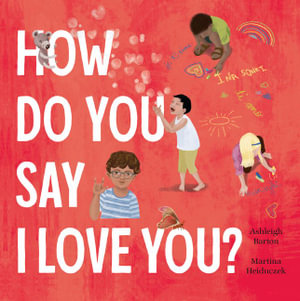How do you say I love you? by Ashleigh Barton

The four lined rhyming stanzas, concisely underscore the love between family members and friends the world over, paralleled and augmented by the illustrations which reflect the diversity and scope of the world’s children.
No matter who we are or where we live, no matter the circumstances or environment, we all say 'I love you', in different ways but the meaning is the same no matter where we are.
We have children often going to school saying 'I love you' as they leave the house, or children returning to the classroom after play saying 'I love you' to their friends, or a child lying at home, too ill for school, saying 'I love you' to her mother, or children waiting for the school bus after farewelling their parents with the words, 'I love you'. A whole array of situations is given, each having the child say 'I love you' to someone else. And the verses tell us more than the three word phrase, often the verse gives us information about the child or its family, their environment or home.
And the words themselves are given in the language the child speaks, linked to the name of the child in the verse.
Readers will love learning 'I love you' in thirteen different languages, from French and Italian to Tongan and Central African. Each child’s name too will be a word that is tried and tested in that language.
The illustrations reflect the country of the verse and the phrase 'I love you', giving readers a chance to spy out things which typify that country. The bold colourful illustrations will draw children’s eyes to seek out the detail which reflects the place the child lives.
I loved the French page, a cold wintry day waits for the child as she comes home on the bus, to be met by her grandparents and taken the rest of the way. The French buildings and street furniture are instantly recognisable.
A wonderful book with which to introduce the term 'I love you' in many languages and encourage children to see outside their classroom, as well as showing them that those three words beg to be shared with their families and friends.
Themes: Love, Family, Diversity, Relationships, Language.
Fran Knight